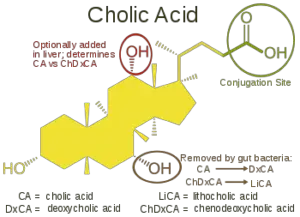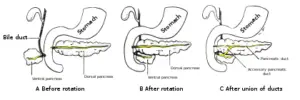
Intermittent fasting can refer to a range of diet plans that cycle between brief periods of fasting and non-fasting, such as the 5:2 diet, alternate-day fasting, and 16:8 diet. The procedure usually involves avoiding grains and sugars and eating unsaturated fats instead.
People who choose to follow an intermittent fasting regime often claim that it helps them lose weight and avoid the constant hunger pangs accompanying a restrictive diet.
Can Intermittent Fasting Cause Gallstones?
However, there is growing concern that such regimes may increase the risk of gallstones. It has been suggested that intermittent fasting could make gallstones more likely by raising cholesterol levels in the gallbladder.
The gallbladder is a small organ that lies beneath the liver and stores bile, which is used to digest fats. Gallstones form when there is an imbalance between three substances – bile salts, bilirubin, and cholesterol. Typically, these proportions are finely balanced, but things can go wrong, resulting in gallstones (1) . High cholesterol levels are thought to be one possible factor contributing to gallstones’ formation, mainly if they provide an alternative binding site for bilirubin and bile salts inside the gallbladder.

While animal research has shown that cholesterol concentrations do rise during periods of fasting, this doesn’t mean that intermittent fasters will inevitably develop gallstones. Fasting diets usually involve abstaining from food for between 16 and 72 hours, such as missing breakfast or lunch one day a week. This is quite different from the fasting regimes adopted by those with eating disorders such as anorexia, who go without food altogether for several days in a row.
The 5:2 diet became famous in 2012 and involved eating normally five days a week and restricting calories to 500 for women and 600 for men on the other two days. A study carried out at the University of Graz, published in 2012, looked at data from 10 different studies assessing intermittent fasting regimes’ effect on cholesterol levels. It found that some fasting regimes had only a transient effect on cholesterol, while more severe forms of intermittent fasting could have more pronounced effects.
How Can Intermittent Fasting Cause Gallstones?
As your body metabolizes fat during the process of rapid weight loss, the liver can excrete excess cholesterol into the bile. During fasting periods, when food consumption is severely restricted or stopped altogether, the liver pumps out more cholesterol into the bile, which leads to gallstone formation.
So far, no epidemiologic studies have shown an increased risk of gallstones in people following intermittent fasting diet plans. However, any change in your diet should be discussed with your doctor before starting, especially if you have a family history of gallstones or have had them in the past.
Also, fasting will decrease gallbladder movement, thus causing your bile to be concentrated with cholesterol which may cause gallstones.

What are the Major Symptoms of Gallstones?
Here is a list of its symptoms:
- Persistent, often severe pain in the upper-middle or right side of your abdomen may spread to your back and shoulder.
- Pain that comes and goes increases with eating fatty food or during fasting periods. Moderately intense pain lasts from 30 minutes to several hours that typically come after eating (2).
- Abdominal bloating may make your stomach stick out. This might be accompanied by nausea and vomiting, primarily if the gallstone blocks the bile duct or creates a pancreatic duct infection.
- The sudden onset of fever, chills, nausea, and vomiting with abdominal pain.
- If you have any combination of these symptoms, you should get checked out by your trusted physician without any delay.
How to Prevent Gallstones when Fasting?
Having gallstones does not necessarily mean that you cannot fast, but it is vital to be aware of the change in your body while fasting and take precautions. Here are some tips on how to prevent gallstones while fasting:
Drink plenty of water during the entire day if you decide to do intermittent fasting. During water fasting, drink at least 2.7 liters of water daily to help flush out toxins from your body through urine and sweat. Make sure you drink enough water on fasting days; during periods of fasting, it is essential to maintain proper hydration.
Rice, fruits, and vegetables are the safest kinds of food you can consume on non-water fast days. These foods are packed with water and fiber, which help to keep you hydrated throughout the day.
Avoid coffee, tea, caffeinated soda, and other stimulants as they can act as diuretics, thus dehydrating your body.
Cut out red meat during the fasting period since it takes more energy for your body to metabolize than other kinds of meat.
It is always advisable to start intermittent fasting after consulting with your doctor and understanding the pros, cons, and precautions.
Conclusion
There is no direct evidence that fasting intermittents cause gallstones, but gallstones can occur if you follow low-fat diets and consume less than 500 kcal on some days. The safest way would be to maintain a good diet, practice regular exercise during intermittent fasting, and drink lots of water.
Article Studies, References, and Resources
- Gallstones By Gabriel E Njeze – https://www.ncbi.nlm.nih.gov/pmc/articles/PMC3899548/
- What Does Gallbladder Pain Feel Like? By Alana Biggers M.D MPH – https://www.healthline.com/health/what-does-gallbladder-pain-feel-like


great, excellent service i’ll refer people back here. Definitely I great experience.
This is a great application, thanks to them my channel finally started to live, I recommend
I’m very grateful to have found this site. very useful and helpful with my career.
The service offered is very satisfactory and it is 100% good for everyone
It is a great service with good value, I recommend
I’ve used this website loads and it works so well! Happy with the results every time and it comes in seconds!
This service was fantastic! Best purchase yet! I haven’t experienced any dropped followers at all, through the 2 months I’ve had them. Also, the followers are real people, they are not bots. Helped out a lot would definitely recommend for anyone share with your friends and family!!!
They helped me when no one else would get the services i needed
This site has helped me so much in more ways than one, and I am so appreciative of the hard working group managing all of it.
This is awesome my veiws went throught the roof thank you IG Take!!!!
Very nice! I like the experience.
Really nice experience I got my followers really fast plus some free likes ! I recommend ! Great service !